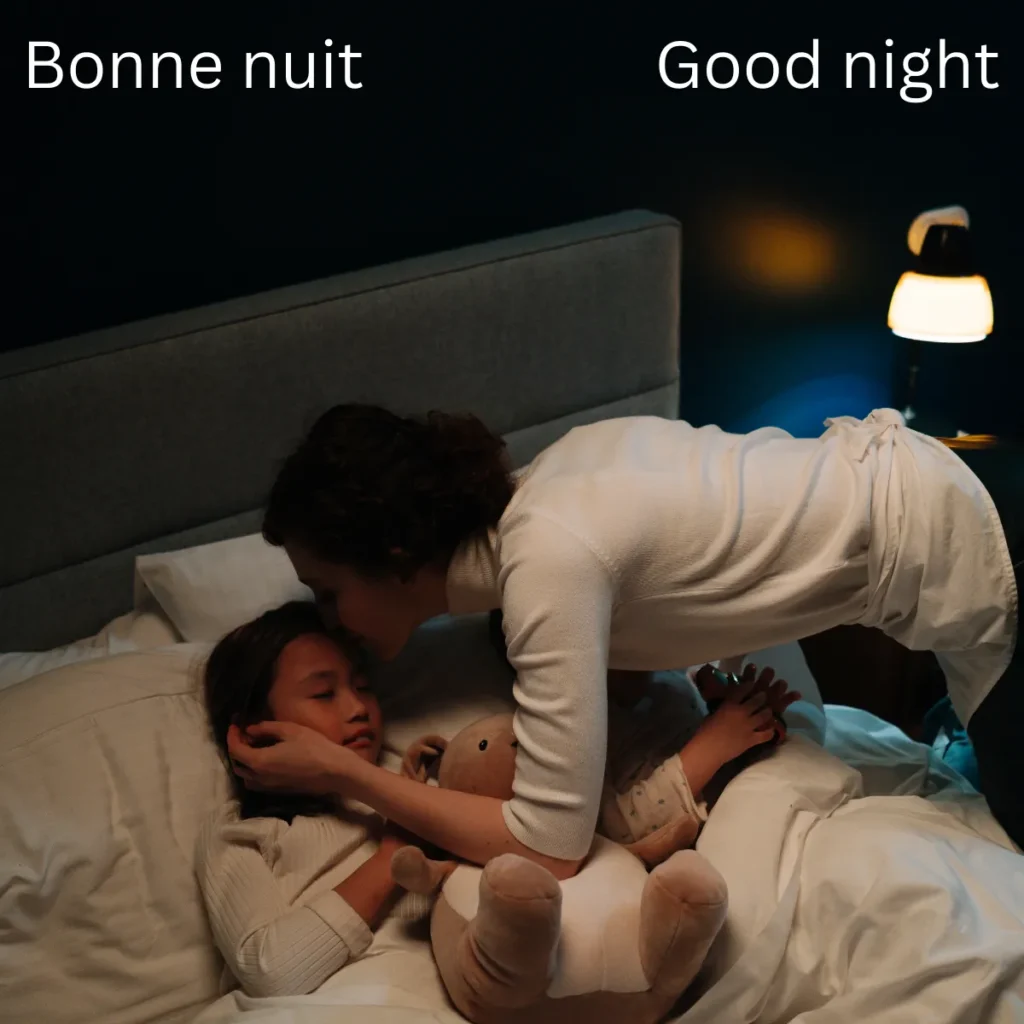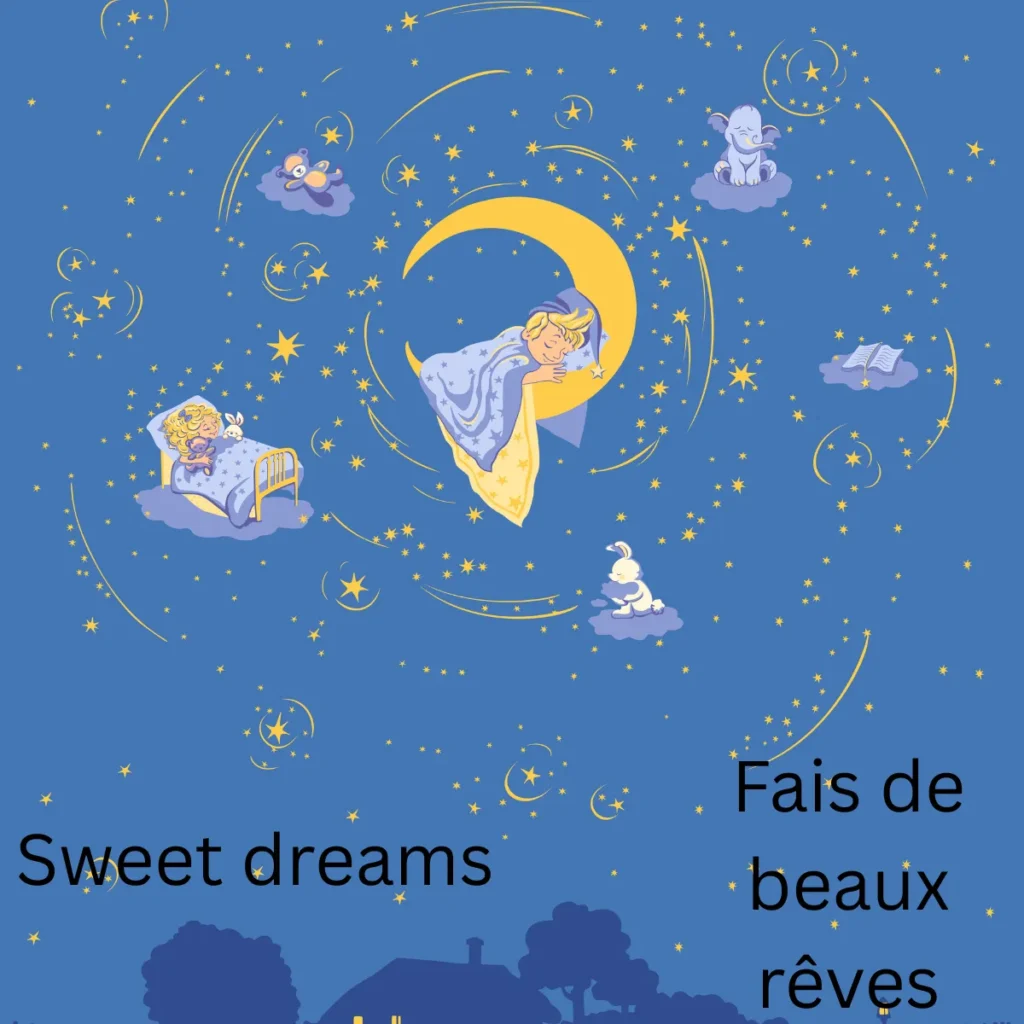Good night” in French is most commonly said as “Bonne nuit.” It’s a polite and natural phrase used when someone is going to sleep or ending the day. French speakers use it with family, friends, and even in formal situations.
Many users search for how to say goodnight in French when learning basic French phrases, traveling to France, or chatting with French-speaking friends. The user intent is clear: they want a quick, correct, and easy phrase that sounds natural and respectful.
In this guide, you’ll learn the correct way to say “good night” in French, how it’s used in daily conversation, and simple pronunciation tips. The explanation is beginner-friendly, written in simple words, and easy to remember for everyday use.
Say Goodnight in French Examples
Let’s explore 15 beautiful and culturally rich ways to say goodnight in French—so you can end every evening on the perfect note.
15 Ways to Say Goodnight in French
| No. | French Phrase | English Meaning |
|---|---|---|
| 1 | Bonne nuit | Goodnight |
| 2 | Dors bien | Sleep well |
| 3 | Fais de beaux rêves | Sweet dreams |
| 4 | À demain | See you tomorrow |
| 5 | Repose-toi bien | Rest well |
| 6 | Bonne soirée | Have a good evening |
| 7 | Que tu fasses de beaux rêves | May you have sweet dreams |
| 8 | Passe une bonne nuit | Have a good night |
| 9 | À plus tard | See you later |
| 10 | À bientôt | See you soon |
| 11 | Bonne nuit mon amour | Goodnight my love |
| 12 | Bonne nuit ma chérie / mon chéri | Goodnight darling |
| 13 | Dormez bien | Sleep well (formal/plural) |
| 14 | Que tes rêves soient doux | May your dreams be sweet |
| 15 | Bonne nuit et fais de beaux rêves | Goodnight and sweet dreams |
1. Bonne nuit – Good night

Origin:
The most standard way to say “goodnight” in French. It literally translates to “good night.”
Example:
👤 User A: Je vais dormir. Bonne nuit !
👤 User B: Bonne nuit ! Fais de beaux rêves.
Use: Universal; appropriate for friends, family, children, or anyone.
2. Dors bien – Sleep well
Origin:
From the verb dormir (to sleep). This phrase is used as a caring goodnight wish.
Example:
👤 User A: À demain. Dors bien !
👤 User B: Merci, toi aussi !
Use: Friendly or intimate; often used with someone close.
3. Fais de beaux rêves – Sweet dreams

Origin:
Literally means “make beautiful dreams.” Used the same way English speakers say “sweet dreams.”
Example:
👤 User A: Bonne nuit, ma chérie. Fais de beaux rêves.
👤 User B: Merci, toi aussi mon amour.
Use: Romantic or loving; used with kids or partners.
4. À demain – See you tomorrow
Origin:
Literally means “Until tomorrow.” Common in both casual and formal settings when ending the evening.
Example:
👤 User A: Je suis fatigué. À demain !
👤 User B: Repose-toi bien. À demain !
Use: Casual and friendly; ideal for colleagues, friends, or classmates.
5. Bonne soirée – Have a good evening
Origin:
Used earlier in the evening (before someone goes to bed). It emphasizes enjoying the rest of the evening.
Example:
👤 User A: Je rentre chez moi. Bonne soirée !
👤 User B: Merci ! Toi aussi !
Use: Formal or informal; when leaving a social setting in the evening.
6. Bonne nuit mon amour – Goodnight my love

Origin:
A tender variation of “bonne nuit,” often used in romantic relationships.
Example:
👤 User A: Bonne nuit mon amour.
👤 User B: Bonne nuit, je t’aime.
Use: Romantic; couples, partners.
7. Repose-toi bien – Rest well
Origin:
Literally means “rest yourself well.” A kind, caring phrase used to show concern.
Example:
👤 User A: Tu as eu une journée difficile. Repose-toi bien.
👤 User B: Merci, c’est gentil.
Use: Close friends, family, partners.
8. Bonne nuit les petits – Good night, little ones
Origin:
Popularized by the famous French children’s TV show “Bonne nuit les petits” that aired from the 1960s.
Example:
👤 User A: Allez, au lit. Bonne nuit les petits !
👤 User B: Bonne nuit Papa !
Use: Used with young children; affectionate.
9. Je vais me coucher – I’m going to bed
Origin:
Not a wish, but a statement often followed by a goodnight phrase.
Example:
👤 User A: Je vais me coucher. À demain !
👤 User B: D’accord, bonne nuit !
Use: Natural way to end a conversation before sleeping.
10. Bonne nuit à tous – Good night, everyone
Origin:
Adds the plural “à tous” to include a group of people.
Example:
👤 User A: Bon, je vous laisse. Bonne nuit à tous !
👤 User B: Bonne nuit !
Use: Group settings like family dinners, meetings, or group chats.
11. Fais de jolis rêves – Have pretty dreams
Origin:
Similar to “fais de beaux rêves,” but “jolis” is more affectionate and cute.
Example:
👤 User A: Bonne nuit, fais de jolis rêves.
👤 User B: Merci, toi aussi !
Use: With kids or in romantic settings.
12. À plus tard / À toute – See you later / See ya
Origin:
Casual French farewells, sometimes used at night before bed among friends.
Example:
👤 User A: Je vais pioncer. À plus !
👤 User B: À toute ! Dors bien.
Use: Informal and youthful.
13. Que tu dormes bien – May you sleep well
Origin:
A more poetic or formal structure, sometimes heard in literature or old-fashioned speech.
Example:
👤 User A: Que tu dormes bien, mon fils.
👤 User B: Merci Papa, bonne nuit.
Use: Formal, poetic, or parental.
14. Bonne nuit et à bientôt – Good night and see you soon
Origin:
Polite way to close an evening with someone you’ll see again soon.
Example:
👤 User A: C’était une belle soirée. Bonne nuit et à bientôt !
👤 User B: Oui, à très bientôt !
Use: Friendly or semi-formal settings.
15. Bonne nuit ma belle / mon beau – Goodnight beautiful / handsome
Origin:
Affectionate and flirty; “ma belle” and “mon beau” are gendered terms of endearment.
Example:
👤 User A: Bonne nuit, ma belle.
👤 User B: Bonne nuit, mon cœur.
Use: Romantic or flirtatious.
FAQs
1. What is the basic way to say goodnight in French?
The basic and most common phrase is “Bonne nuit” which means “Good night.”
2. How do I say goodnight to someone I love?
You can say “Bonne nuit, mon amour” meaning “Good night, my love.”
3. How do I say goodnight in a polite or formal way?
Use “Bonne nuit à vous” which is a respectful version.
4. What phrase do parents use with children?
They often say “Fais de beaux rêves” meaning “Sweet dreams.”
5. Can I use “Bonsoir” to say goodnight?
No — “Bonsoir” means “Good evening”, usually used when greeting, not when going to sleep.
6. How do I say “Sleep well” in French?
Say “Dors bien” (to one person) or “Dormez bien” (to more than one person).
7. How do I text “Goodnight” casually to a friend?
You can simply send “Bn8” which is French texting slang for “Bonne nuit.”
8. How do I say “Goodnight everyone”?
Say “Bonne nuit à tous” meaning “Goodnight everyone.”
9. How do I say “Sweet dreams” politely?
You can say “Faites de beaux rêves” (formal/polite version).
10. Is “Bonne nuit” used at any time of day?
No — it’s only used when someone is about to sleep.
Conclusion:
knowing how to say Goodnight in French allows you to end the day with warmth, respect, or affection. From formal expressions to romantic phrases, each option helps you connect more deeply with the person you’re speaking to. Using the right phrase shows care and makes your conversation more meaningful.



